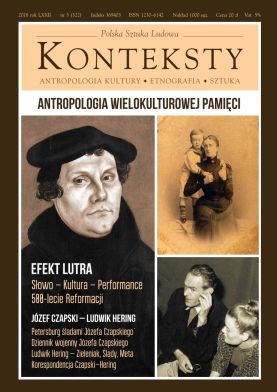Czytanie psalmów z Lutrem
Reading the Psalms together with Luther
Author(s): Aleksander NawareckiSubject(s): Fine Arts / Performing Arts, Theology and Religion
Published by: Instytut Sztuki Polskiej Akademii Nauk
Keywords: Luther;Protestantism;Psalms
Summary/Abstract: A text dedicated to comments on the Psalms by Martin Luther, whose rank is testified by the fact that in Luther’s biography the onset of Reformation undertakings (1517) coincides with the presentation, interpretation, translation, and publication of the Psalms, to which historians pay insufficient attention. A symptomatic fact from this period is the accepted pseudonym (Eleutheros) and the change of the surname Luder to Luther, motivated by the symbolic presence of the letters/sound “the”. The author drew attention to the similarity of the new names with the word: Lautherist (lute player) and its source: Lauthe (lute). Martin Luther, who did play the lute, assumed the part of David, and did so at a time when in Germany the fashionable lute replaced the archaic psaltery (from which psalms took their name). The Polish reader knows little about this since among the texts of Psalms by the Reformer (the contents of five volumes in the American edition of his works), only the second Preface to the Psalter (1528) was translated into the Polish, and several remarks on this topic appeared in an introduction to the Catholic version of the Psalms (1988, Polish translation 2007) by G. Ravasi. The Polish reader may thus reach - out of sheer necessity – for Reading the Psalms with Luther (1993), i.e. Luther’s version of the Psalms, today the most popular in the world. This psalter is a compilation of assorted texts by Luther, based on Summarien über die Psalmen (1531–1533). A set of 150 brief comments indicates in each Psalm the presence of five fundamental functions (1. Prophecy; 2. Teaching; 3. Consolation; 4. Prayer; 5. Thanksgiving) together with references to the Ten Commandments and seven calls in the Our Father prayer. Luther demonstrated in a “summarizing” way that the Psalms are a “Small Bible” condensing the diversity of the Old and New Testament; at the same time he devised a poetic of counting the “functions” inscribed into the holy text. In this way he appears as a protagonist of a functional and structural analysis of the text, which directly inspired V. Propp (Morphology of the Tale) and indirectly – masters of narrative grammar: C. Levi-Strauss, R. Barthes, A. Greimas, and T. Todorov.
Journal: Konteksty
- Issue Year: 322/2018
- Issue No: 3
- Page Range: 154-161
- Page Count: 8
- Language: Polish
- Content File-PDF

